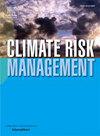Unified in diversity: Unravelling emerging knowledge on drought impact cascades via participatory modeling
IF 4.8
2区 环境科学与生态学
Q1 ENVIRONMENTAL SCIENCES
引用次数: 0
Abstract
Diverse groups exhibit enhanced capabilities in tackling complex problems compared to individuals. Also, involving diverse stakeholders has been shown to improve the understanding of complex social-ecological systems. Considering this, we investigated how pooling the knowledge of diverse stakeholder crowds can create new, emergent knowledge on cascading drought impacts. We define ‘emergent knowledge’ as information that only becomes visible when multiple perspectives are combined. Therefore, we used participatory modeling to capture the systemic effects of droughts on diverse socio-economic and environmental systems. We interviewed 25 stakeholders with different expertise to obtain individual causal loop diagrams (CLDs) representing how drought impacts propagate in a case study in Thuringia, Germany. These CLDs were aggregated to develop a collective CLD. We then compared the individual and collective CLDs using graph theory statistics. Our analysis revealed emergent system-level features, such as feedback loops, that only became apparent when combining individual perspectives. Also, variables like ‘biodiversity loss’, which had minimal influence within the individual CLDs, gained influence in the collective CLD. These findings demonstrate how pooling diverse stakeholder knowledge on cascading drought impacts unveils new insights that may be hidden when considering only individual perspectives. We anticipate these findings to enhance the integration of knowledge from diverse stakeholder crowds when studying complex drought impacts. Furthermore, these findings highlight the need for careful consideration in selecting domain expertise in participatory processes that study drought impact cascades, as the system dynamics can vary substantially.
统一于多样性:通过参与式建模了解干旱影响级联的新知识
与个人相比,多元化群体在解决复杂问题方面表现出更强的能力。此外,事实证明,让不同的利益相关者参与进来可以提高对复杂社会生态系统的理解。有鉴于此,我们研究了汇集不同利益相关者群体的知识如何能够创造出关于干旱连带影响的新的新兴知识。我们将 "新兴知识 "定义为只有在多种观点相结合时才能显现的信息。因此,我们使用参与式建模来捕捉干旱对不同社会经济和环境系统的系统性影响。我们采访了 25 位具有不同专业知识的利益相关者,获得了代表干旱影响如何在德国图林根案例研究中传播的单个因果循环图(CLD)。这些因果循环图经过汇总后形成了集体因果循环图。然后,我们利用图论统计对个体和集体的 CLD 进行了比较。我们的分析揭示了新出现的系统级特征,如反馈回路,而这些特征只有在结合个体观点时才会显现出来。此外,像 "生物多样性丧失 "这样的变量,在个体 CLD 中的影响微乎其微,但在集体 CLD 中的影响却越来越大。这些研究结果表明,将利益相关者关于干旱连带影响的不同知识汇集起来,可以揭示出仅从个体角度考虑可能会被掩盖的新见解。我们预计,在研究复杂的干旱影响时,这些发现将加强对来自不同利益相关者群体的知识的整合。此外,这些发现还强调,在研究干旱影响级联的参与式过程中,由于系统动态可能会有很大的不同,因此在选择领域专业知识时需要慎重考虑。
本文章由计算机程序翻译,如有差异,请以英文原文为准。
求助全文
约1分钟内获得全文
求助全文
来源期刊

Climate Risk Management
Earth and Planetary Sciences-Atmospheric Science
CiteScore
8.20
自引率
4.50%
发文量
76
审稿时长
30 weeks
期刊介绍:
Climate Risk Management publishes original scientific contributions, state-of-the-art reviews and reports of practical experience on the use of knowledge and information regarding the consequences of climate variability and climate change in decision and policy making on climate change responses from the near- to long-term.
The concept of climate risk management refers to activities and methods that are used by individuals, organizations, and institutions to facilitate climate-resilient decision-making. Its objective is to promote sustainable development by maximizing the beneficial impacts of climate change responses and minimizing negative impacts across the full spectrum of geographies and sectors that are potentially affected by the changing climate.
 求助内容:
求助内容: 应助结果提醒方式:
应助结果提醒方式:


